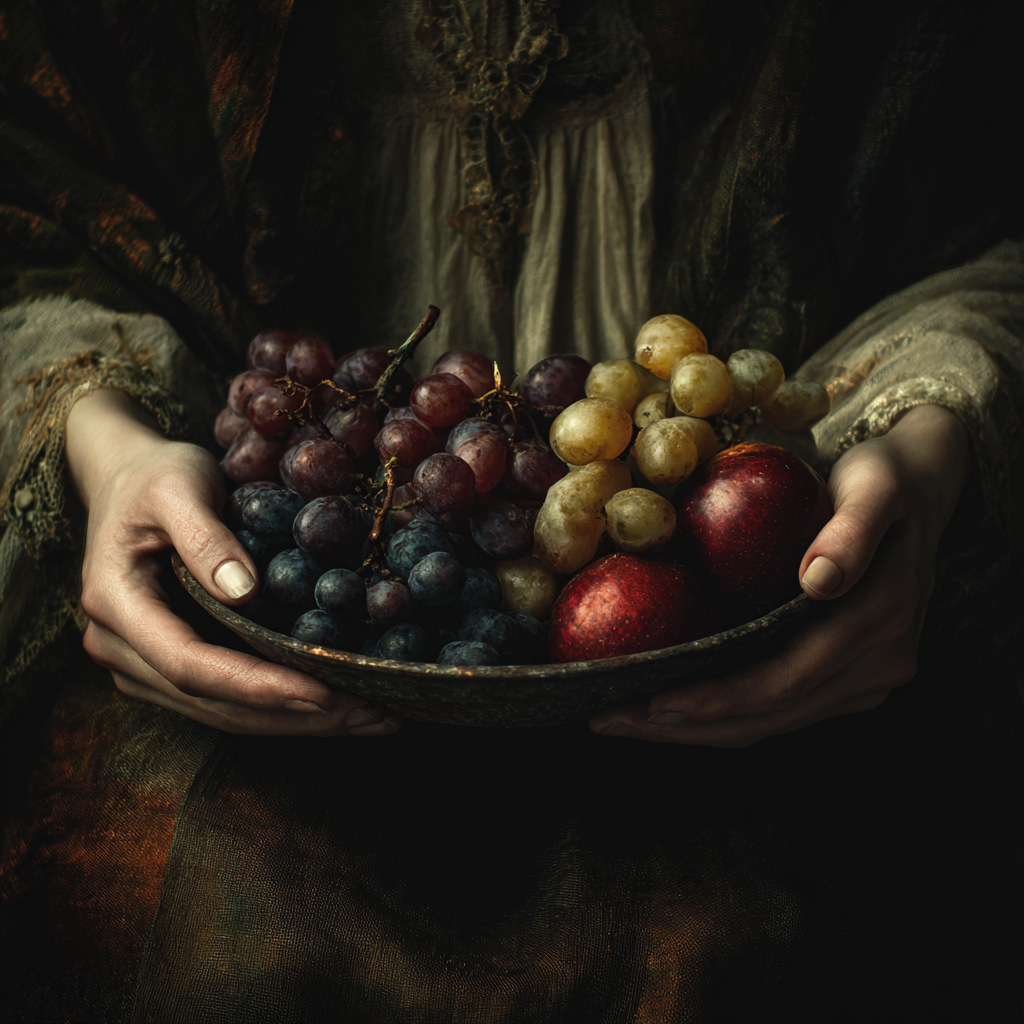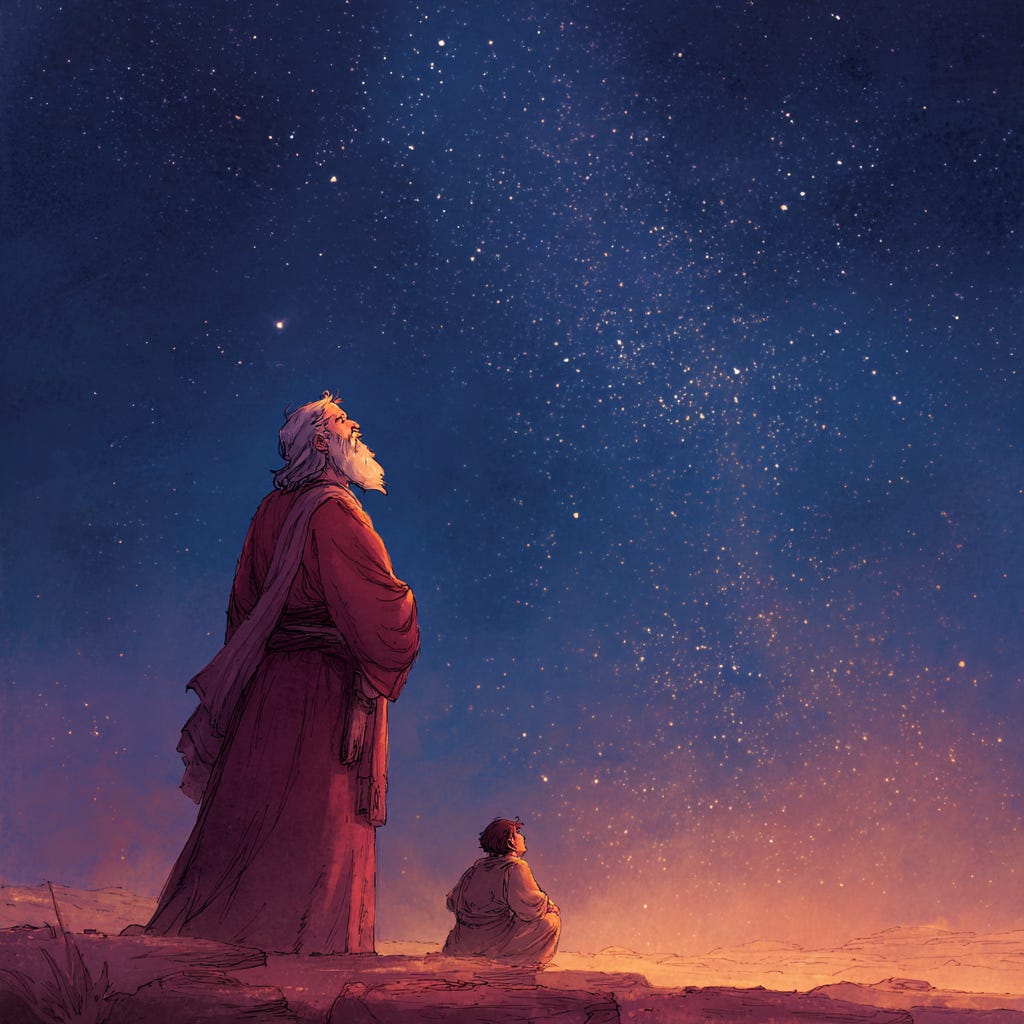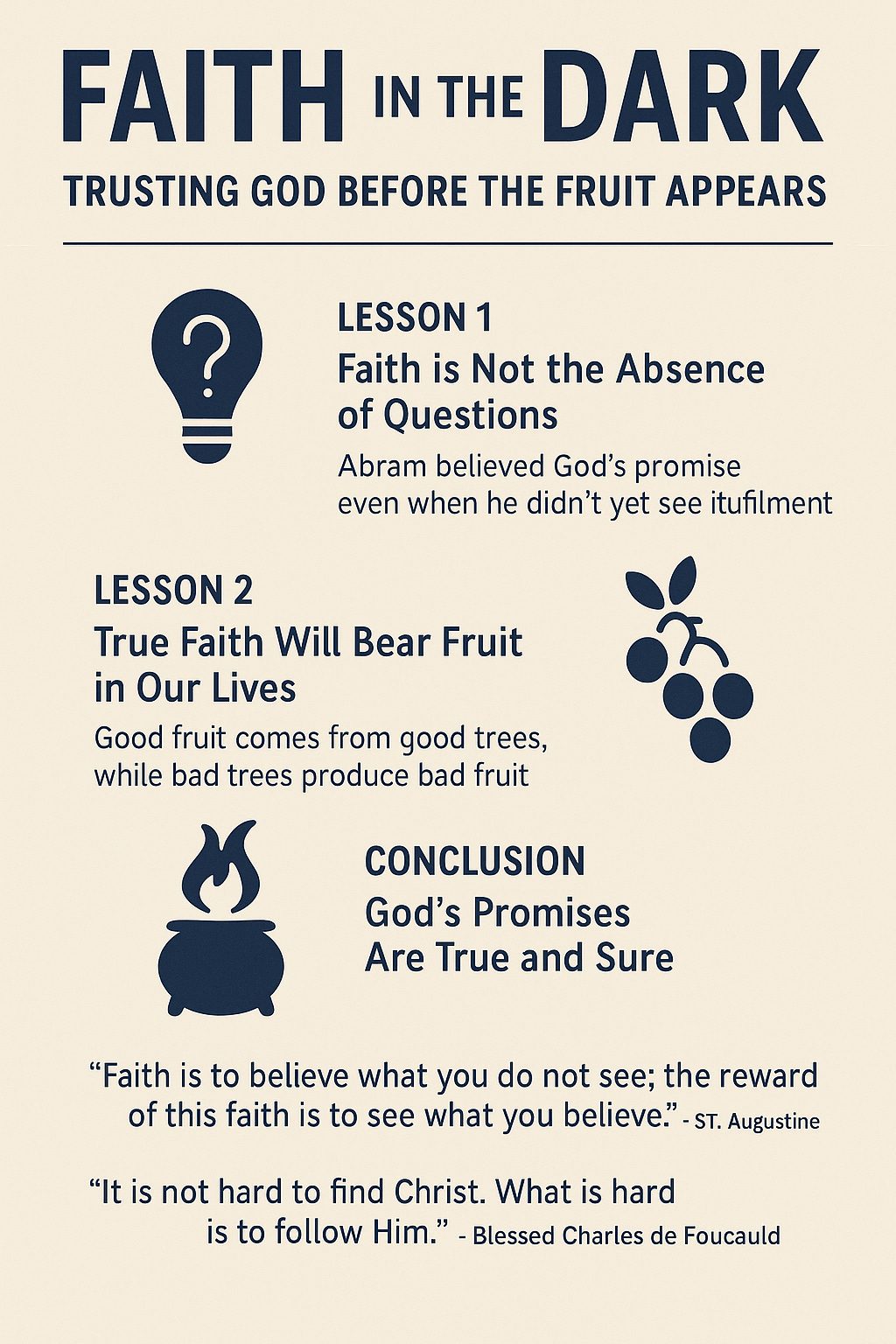Faith in the Dark: Trusting God Before the Fruit Appears
Homily for Wednesday of the Twelfth Week in Ordinary Time
Lectionary 373 | Genesis 15:1-12, 17-18 | Psalm 105 | Matthew 7:15-20
My brothers and sisters in Christ,
Today’s readings speak to a profound and often uncomfortable truth: faith flourishes not in the absence of doubt, but through it. From the ancient covenant with Abram to Jesus’ warning against false prophets, we are reminded that discerning the path of righteousness requires trust, vigilance, and fruitfulness.
Let us begin with the story of Abram, a man already aged, childless, and—by human standards—at a dead end. The Lord comes to him in a vision and declares, “Fear not, Abram! I am your shield; I will make your reward very great.” Now, pause there. How many of us, like Abram, have heard such promises from God or felt hopeful beginnings, only to be met with delay, silence, or confusion?
Abram doesn’t respond with immediate praise. He answers instead with a raw and honest question: “What good will your gifts be, if I keep on being childless?” It’s not faithlessness. It’s faith wrestling with reality. Abram is not afraid to tell God what’s in his heart.
And yet, this conversation becomes the site of one of the most pivotal moments in salvation history. God leads Abram outside and tells him to look at the stars, then makes a promise: “Just so shall your descendants be.” In that moment—before any child was conceived, before any land was possessed—Abram believed. And Scripture tells us, “It was credited to him as righteousness.”
This is not a faith that waits for the proof to appear before believing. It is the opposite: faith that clings to God's word even in the absence of visible results.
And so, the first lesson today is this: faith is not the absence of questions—it is the decision to believe even when the answer is not yet visible.
“Faith is to believe what you do not see; the reward of this faith is to see what you believe.”
— St. Augustine
This covenant moment with Abram is sealed not with words alone, but with ritual. Sacrifice. Darkness. Fire. The covenant God makes is not a transactional agreement, but a profound giving of Himself. This is what the Responsorial Psalm reminds us of: “The Lord remembers His covenant forever.” Even when we forget, even when we stray, God holds fast.
We live in an age where promises are often broken—by leaders, by friends, even within families. But God’s promise stands. His word is bond. And in Jesus Christ, that covenant becomes not just an oath, but a person. A person who walks with us, dies for us, and rises again so that we might live in Him.
Now, turning to the Gospel, Jesus offers a powerful warning: “Beware of false prophets, who come to you in sheep’s clothing, but underneath are ravenous wolves.” These are sobering words. Not everyone who appears good or speaks holy things is doing so from a place of truth. Discipleship is not only about following—it is about discerning.
“By their fruits you will know them,” Jesus says. That line echoes through the centuries, but how do we test for fruit?
It is not about popularity or charisma. It is not about how eloquently someone speaks or how many people follow them on social media. It is about whether their life—and ours—reflects the fruit of the Holy Spirit: love, joy, peace, patience, kindness, generosity, faithfulness, gentleness, and self-control.
A false prophet may dazzle. But a true disciple bears fruit quietly, faithfully, even sacrificially. Abram did not become righteous by having the right answers or by impressing the crowds—he became righteous by believing, even when there was nothing to see.
This brings us to the second lesson today: true faith will always bear fruit in the way we live, even if that fruit is hidden, slow-growing, or overlooked by others.
We may ask, "How do I know if my life is bearing good fruit?" Jesus gives us the answer: you cannot fake fruit. Thornbushes don’t produce grapes. Rotten trees don’t yield sweetness. What comes from within will show eventually.
“It is not hard to find Christ. What is hard is to follow Him.”
— Blessed Charles de Foucauld
So ask yourself: Am I becoming more patient? More compassionate? Am I quick to forgive, slow to anger? Do I use my voice to build others up or tear them down? Do I bring peace into my workplace, my home, my relationships?
If not, perhaps we are feeding the wrong tree.
My friends, today’s readings converge on this reality: God’s promises are true, but they do not exempt us from darkness or delay. Abram received the promise, but still had to wait. The sun set, and the Scripture says a “deep, terrifying darkness enveloped him.” Yes, even the father of faith trembled.
But that darkness did not mean abandonment. It was the very stage upon which God moved. The smoking fire pot and flaming torch—symbols of God's presence—passed through the sacrifice. God walked the path alone. He pledged Himself not only to Abram, but to every one of us who, like Abram, chooses to believe.
So whether you are waiting for clarity in your vocation, for healing in your body, for peace in your family, or for hope in your heart, take courage: God does not forget His covenant.
Today, let us:
Believe like Abram, even in uncertainty.
Watch for fruit, in others and ourselves.
And follow Christ not just with our words, but with our lives.
Let us leave this Mass not simply comforted, but challenged—to grow deeper roots of faith, so that we may bear the good fruit God longs to bring forth in us.
Amen.





